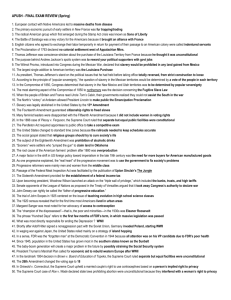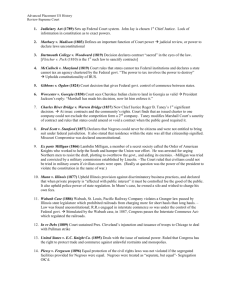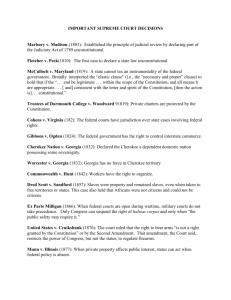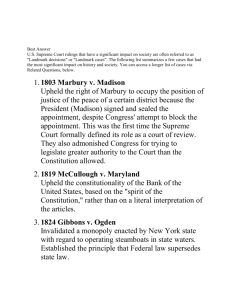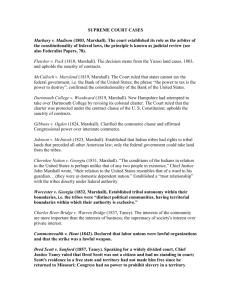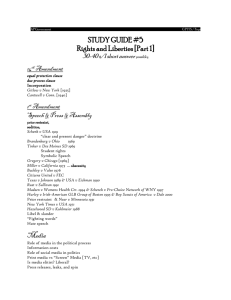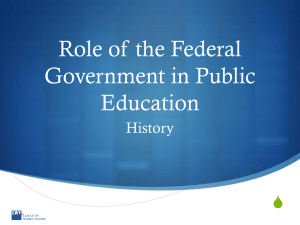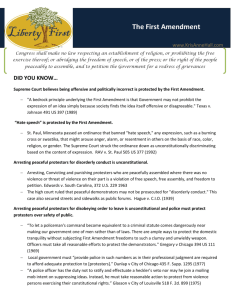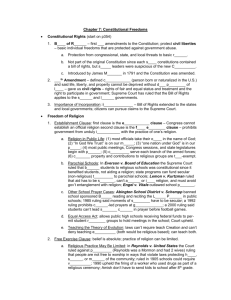Term Paper topic List
advertisement
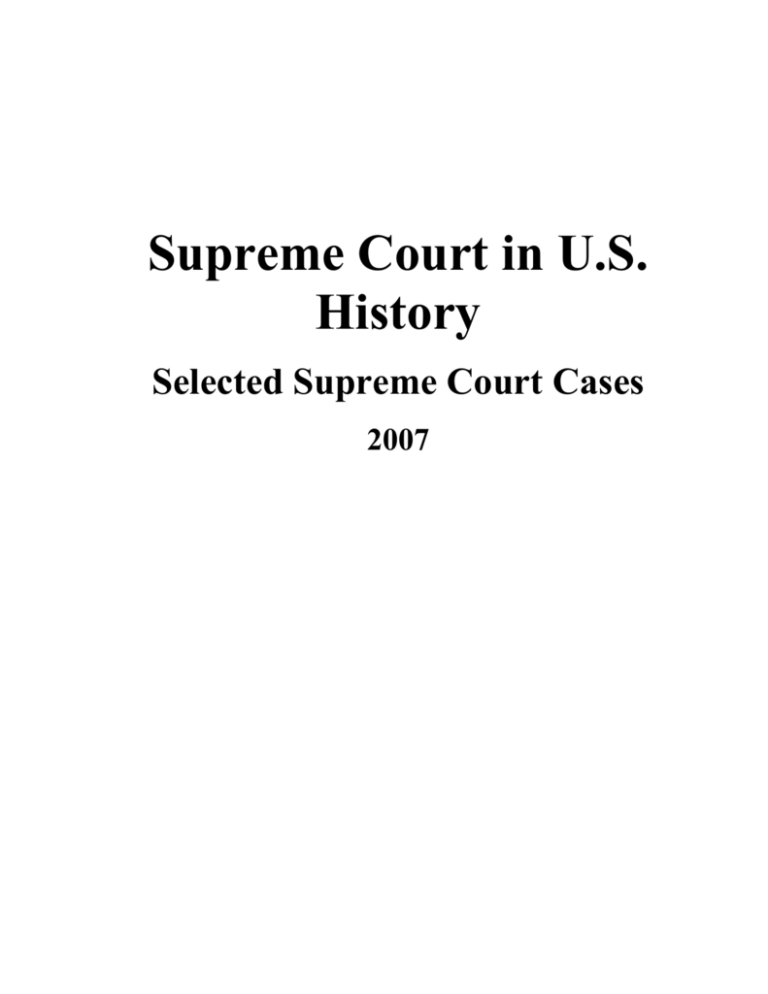
Supreme Court in U.S. History Selected Supreme Court Cases 2007 1. 1793 - Chisholm v. Georgia: Individuals could not sue a state; led to the 11th Amendment. 2. 1810 - Fletcher v. Peck: The case in which a state law was first declared unconstitutional. 3. 1816 - Martin v. Hunter’s Lessee: The Court reaffirmed Fletcher v. Peck which the highest Virginia state court had refused to obey. 4. 1819 - Dartmouth College v. Woodward: A contract cannot be impaired by legislative action. 5. 1821 - Cohens v. Virginia: The Court held that, though state courts may exercise final authority in cases which fall entirely within their jurisdiction, they are subject to the appellate jurisdiction of federal courts if their judgements involve the construction of federal laws, treaties, or the Constitution. 6. 1824 - Gibbons v. Ogden: Interstate commerce defined and limitations placed on states with respect to legislation affecting it. 7. 1829 - Foster v. Neilson: The Court declared that the decisions of the president and Congress are binding on the judiciary in all matters affecting the rights of the United States in foreign affairs; upheld the constitutionality of the Louisiana Purchase. 8. 1831, 1832 - “Cherokee Cases” [Cherokee Nation v. Georgia (1831); Worcester v. Georgia (1832)]: The Court ruled the Georgia Indian statute unconstitutional on the ground that the federal government’s jurisdiction over Indians was exclusive, no state having power to pass any laws affecting them or their territory; the states, with executive assistance, successfully resisted Marshall’s ruling. 9. 1849 - Luther v. Borden: The first Court elaboration of the doctrine of “political questions.” 10. 1857 - Dred Scott v. Sandford: A slave temporarily in free territory did not acquire freedom; the Missouri Compromise declared unconstitutional. 11. 1866 - Ex parte Milligan: Civilians could not be tried by a military court. 12. 1867 - Mississippi v. Johnson: Attempt (unsuccessful) by state to prevent executive from enforcing a law enacted by Congress (Reconstruction Acts). 13. 1870, 1871 - “Legal Tender Cases” [Knox v. Lee ; Parker v. Davis]: Established the right of the federal government to issue treasury notes as legal tender; overturned Hepburn v. Griswold (1870). 14. 1873 - “Slaughterhouse Cases”: Virtually nullified “privileges and immunities” clause of the 14th Amendment. 15. 1877 - Munn v. Illinois: When private property is devoted to public use, it is subject to public regulation. 16. 1883 - “Civil Rights Cases” [five separate cases reviewed together]: Federal act making it a crime to deny Negroes accommodations in inns, public conveyances, and theatres declare unconstitutional; reversed by Jones v. Alfred H. Mayer Co. (1968). 17. 1895 - In re Debs: Upheld a federal injunction against striking Pullman Company employees who had halted railroad transportation in the Chicago area; and sustained President Cleveland in sending troops to the area when the injunction was disobeyed. Unexpected interpretation of the Sherman Anti-Trust Act. 18. 1895 - Pollock v. Farmer’s Loan and Trust Company: Income tax laws held unconstitutional; led to the 16th Amendment. 19. 1895 - United States v. E. C. Knight Company: Manufacturing is not interstate commerce; decision led to the Clayton Anti-Trust Act; famous Harlan dissent. 20. 1896 - Plessy v. Ferguson: Doctrine of separate but equal facilities established; reversed in 1954 Brown case; famous Harlan dissent. 21. 1904 - Northern Securities Co. v. United States: The first successful prosecution under the Sherman Anti-Trust Act. 22. 1905 - Lochner v. New York: Legislation to limit work week to 60 hours ruled unconstitutional. 23. 1911 - Standard Oil Co. v. United States: Under the Sherman Anti-trust Act, the Court ordered the dissolution the Standard Oil Company of New Jersey not because of its huge size but because it had used its economic power through pricing and other manipulative policies to restrain trade unreasonably (“rule of reason”). Note: this is a very challenging case and should be selected by someone willing to put in a lot of extra time to understand the opinion. 24. 1919 - Schenck v. United States: Sustained the conviction of a Socialist Party official who had violated the Espionage Act of 1917 by urging draft resistance. Justice Holmes suggested limitations for government encroachment on the First Amendment’s guarantee of freedom of speech. 25. 1919 - Abrams v. United States: Upheld Espionage Act; Holmes and Brandeis dissent. 26. 1925 - Gitlow v. New York: Conviction under an indictment for criminal anarchy upheld even though there was no “clear and present danger.” 27. 1931 - Near v. Minnesota: The Court declared unconstitutional a state law, ostensibly for the public good but in fact directed at a weekly newspaper in Minneapolis which was accustomed to making violent attacks on the integrity of law enforcement officials. 28. 1932 - Powell v. Alabama: The Court ruled the state had violated the 14th Amendment by denying Negroes the equal protection of the laws. 29. 1936 - Schecter v. United States: The Court declared the National Industrial Recovery Act, a key element in F.D.R.’s New Deal program, unconstitutional. 30. 1936 - United States v. Curtiss-Wright Export Corp.: The Court upheld a statute authorizing the president to exercise broad discretion, with no criterion specified for its use, in issuing a proclamation to embargo a shipment of arms to foreign belligerents. 31. 1937 - Palko v. Connecticut: Sustained the right of a state to appeal in a criminal case to a higher court. Later overruled by Benton v. Maryland (1969). Both cases concern the applicability of the Fifth Amendment’s guarantee against double jeopardy and that right’s relation to the 14th Amendment. 32. 1937 - DeJonge v. Oregon: The Court ruled a person cannot be punished merely for speaking under the auspices of an organization found to be subversive. 33. 1937 - National Labor Relations Board v. Jones & Laughlin Steel Corporation: Upheld the constitutionality of the National Labor Relations Act. The Court virtually abandoned the doctrine of United States v. E. C. Knight Co. that manufacturing is not commerce. 34. 1948 - McCollum v. Board of Education: The Court ruled that public school facilities may not be used for religious purposes. 35. 1952 - Youngstown Sheet & Tube v. Sawyer: In this case, often called “the steel seizure case,” the Court struck down President Truman’s executive order to seize the nation’s steel mills in order to prevent a strike during the Korean War. 36. 1957 - Roth v. United States: Obscenity defined. 37. 1961 - Mapp v. Ohio: The Court ruled states may not use evidence obtained by illegal search. 38. 1962 - Engel v. Vitale: The Court declared that a state may not prescribe a form of prayer for use in public schools. 39. 1964 - Reynolds v. Sims: Equal protection clause insures apportionment based on population; extended the principle of “one man, one vote.” 40. 1966 - Miranda v. Arizona: The Court ruled a suspect can be interrogated only after full understanding of constitutional rights. 41. 1968 – Jones v. Mayer : Racial discrimination in real estate transactions. 42. 1969 - Powell v. McCormack: The Court confronted the issue of whether Congress possessed the authority to remove a duly elected member from its body. 43. 1969 - Tinker v. Des Moines Independent Community School District: The Court declared that the First Amendment limits state power to prohibit political protest in schools. 44. 1970 - Welsh v. United States: A selective service registrant can properly be classified a conscientious objector on the grounds of moral or ethical beliefs alone. 45. 1971 - New York Times Company v. United States: First Amendment would be violated if the government were permitted to prevent publication of “Pentagon Papers” on the basis of national security. 46. 1972 - United States v. United States District Court for the Eastern District of Michigan: The Court held wiretapping without a warrant in domestic subversive cases to be unconstitutional. 47. 1972 - Furman v. Georgia: The Court ruled that imposition and execution of death penalty according to current procedures violated the "cruel and unusual punishment ban of the Eighth Amendment. 48. 1972 - Branzburg v. Hayes - Is the requirement that news reporters appear and testify before state or federal grand juries an abridgement of the freedoms of speech and press as guaranteed by the First Amendment? 54. 1973 - Miller v. California: Established community standards test for obscenity. 56. 1974 - United States v. Richard M. Nixon: Neither separation of powers nor general assertion of privileged confidentiality entitles a president to withhold evidence from a criminal trial; crucial “Watergate” case. 57. 1981 - Rostker v. Goldberg: The Court considered the legality of conscription laws that required men, but not women, to register for the draft. 58. 1984 - United States v. Leon: The Court allowed evidence seized by police using defective search warrants to be used in criminal trials. It was the first time since 1914 that the Court had narrowed the “exclusionary rule” – which bars use of illegally obtained evidence – to allow exceptions based on the good faith of police officers who believed they did nothing wrong. 59. 1988 - Hazelwood School District v. Kuhlmeier: The Court restricted the First Amendment rights of high school students. 60. 1989 - Texas v. Johnson: The Court ruled on the constitutionality of a Texas law that prohibited the burning of the American flag. 61. 1990 - Cruzan v. Missouri: The Court confronted the question of whether or not a citizen has the right to die. 62. 1991 - Cohen v. Cowles Media Co.: The Court ruled that news organizations can be sued when they break a promise and disclose a confidential source. 63. 1992 – Casey v. Planned parenthood of Pennsylvania. Do states have a right to regulate abortion so long as the regulations placed no "undue burden" on the right of women to have an abortion? (Good follow-up to Roe v. Wade) 64. 1993 - Harris v. Forklift System, Inc.: The Court considered whether gender discrimination was prevented under provisions of the 1964 Civil Rights Act 65. 1995 - Babbitt v. Sweet Home Chapter of Communities for a Great Oregon: The Supreme Court -- ruling in one of the most important environmental cases in a generation – affirmed the government’s broad authority to require private landowners to protect the habitat of endangered wildlife. The Court’s holding was a major victory for proponents of the powers of the 1973 Endangered Species Act. 66. 1995 - Miller v. Johnson: The Court found Georgia’s creation of three majority-black congressional districts in an attempt to comply with the Voting Rights Act of 1965 violated the equal protection rights of white voters, and it criticized the Justice Department for being too aggressive in demanding creation of such districts. 67. 1995 - U.S. Term Limits v. Thornton: In the “term limits” case, the Supreme Court ruled that in the absence of a constitutional amendment, neither states nor Congress may limit the number of terms that members of Congress can serve. 68. 1996 - United States v. Virginia, et al. The Supreme Court maintained that the Constitution’s equal protection guarantee precluded Virginia from reserving exclusively to men the unique educational opportunities afforded by the Virginia Military Institute (VMI). 69. 1997 - Clinton v. Jones: Is a serving president, for separation of powers reasons, entitled to absolute immunity from civil litigation arising out of events which transpired prior to his taking office? 70. 1998 - Clinton v. City of New York: Did the president’s ability to selectively cancel individual portions of bills, under the Line Item Veto Act, violate the Presentment Clause of Article I? (a separation of powers issue). 71. 1999 - Department of Commerce v. United States House of Representatives: Must the census be conducted by a traditional head count or can computer-assisted sampling techniques be used? 72. 1999 - Davis v. Monroe County: Are school districts liable for failing to stop one student’s harassment of another student? 73. 2000 - Boy Scouts of America et al. v. Dale: Can a private, not-for-profit organization legally discriminate against groups which do not share its values? 74. 2000 - California Democratic Party et al. v. Jones, Secretary of State of California, et al.: Are “blanket” primaries constitutional? 75. 2000 - Bush v. Gore: Did the Florida Supreme Court violate Article II Section 1 Clause 2 of the U.S. Constitution by making new election law? Do standardless manual recounts violate the Equal Protection and Due Process Clauses of the Constitution? 76. 2001 - PGA Tour, Inc. v. Martin: Did the Professional Golf Association violate the Americans with Disabilities Act when it prohibited a disabled golfer from using a golf cart in a tournament? 77. 78. 2003 - Gratz v. Bollinger: Does the University of Michigan's use of racial preferences in undergraduate admissions violate the Equal Protection clause? 2005 - Kelo v. City of New London: Does a city violate the Fifth Amendment's takings clause if the city takes private property and sells it for private development, with the hopes the development will help the city's bad economy?
